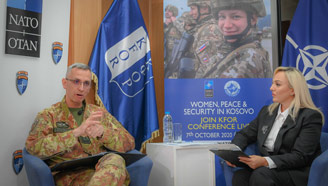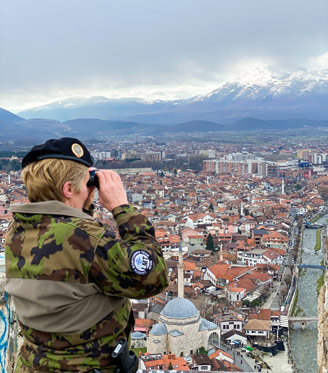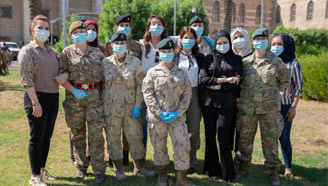Views from the field
Interview with Major-General Jennie Carignan, Commander NATO Mission Iraq, and Major-General Michele Risi, Commander NATO’s Mission in Kosovo.
- English
- French
NATO operations and missions are important avenues for the implementation of Women, Peace and Security (WPS) in NATO, and gender analyses ensure they take account of the different perspectives of women and men. This is why we asked Major-General Jennie Carignan, Commander of NATO Mission Iraq (NMI) since December 2019, and Major-General Michele Risi, Commander of NATO’s Mission in Kosovo (KFOR) since November 2019, about their views on the role of Women, Peace and Security in theatre. Thank you, Generals, for all the important work that you do in support of Women, Peace and Security at NATO.

How important is the WPS mandate to the successful implementation of your mission?
COM NMI: Extremely important. Our mission in Iraq is to advise the Ministry of Defence in building a military force that is more efficient, trusted by the Iraqi people, and has strong leadership, with secure ties to international allies and partners. We are to assist in the development of a force for good, to have a stabilizing effect for Iraq. However, to be a force for good, Iraqis have to see themselves in their own military forces. In that sense, it is crucial that women and the wealth of Iraq’s diverse population be given the opportunity to serve as active and valued contributors in its defense. The proof is there. When we look around the world, nations are stable and prosper when women are equal partners in their military, government, and communities. We have to remember that women constitute 50% of Iraq’s population. Stability and prosperity are not possible to build when half of your population is absent from decision making and conflict resolution processes. Young women under the age of 24 comprise one quarter of the population of Iraq. This represents a significant untapped resource for the Iraqi security forces.
“Continuous cultural change driven by the senior civilian and military leadership of NATO is the key to success.”
The Ministry of Defence can take the lead and champion the Women, Peace and Security agenda through its security sector reforms, thereby increasing the integrity of the force and Iraqi population’s confidence in its armed forces. Successful incorporation of the WPS agenda means that all members of the Iraqi security services, both men and women, will be better educated and equipped to deny enemy attempts to exploit gender and, thus, prevent vulnerable populations from further harm.

COM KFOR: UNSCR 1325 is very important to the successful implementation of KFOR’s mandate. I see a gender perspective as a force multiplier and a tool to better achieve our mandate. The implementation of the Women, Peace and Security mandate must be in line with the overall mission’s mandate. For us at KFOR this is UNSCR 1244. Based on this, KFOR is to contribute to a safe and secure environment and freedom of movement for all citizens in Kosovo. Therefore, in line with this mandate, it is crucial for me to take into account the different security needs of men, women, boys, and girls. Other organizations in Kosovo also implement UNSCR 1325 and related resolutions in their mandates, among them UNMIK, EULEX, and the OSCE. KFOR makes a concerted effort to liaise closely with them to ensure that the aim of UNSCR 1325 is achieved. The approach KFOR has now undertaken is completely inclusive. All parties are considered in the equation, the young, the old, men, women, boys, and girls, regardless of their ethnic and religious backgrounds.
KFOR supports the continuation of the Pristina-Belgrade dialogue and I believe that all members of the society should be represented in the process. KFOR is convinced that lasting peace in Kosovo will only be achieved by fully engaging all members of Kosovo society in the peace process. As women and minorities are often not represented, even proportionally, in formal or official positions, KFOR recognizes the importance of both female participation and ethnic minorities at the highest level in government.
I want to stress that the WPS mandate should not be seen as an add-on or a stand-alone topic, but it needs to be integrated into the staff procedures and assessments of all branches, as a tool to better achieve our mandate.

When did you first become aware of the importance of integrating gender into military operations? What was the moment of realization for you that there was a practical reason for considering gender in relation to operational tasks?
COM NMI: To be blunt, a few years ago, I did not see the need to integrate gender in military operations. But starting in 2012, I was invited to speak at various forums to allies on the integration of women in the combat arms. Not being an expert on gender and WPS, I had to spend a significant amount of time to reflect on my own Canadian experience and learn about the gender perspectives. That allowed me to not only explore a whole new range of opportunities and solutions when looking through the lens of gender, but also to better understand “ourselves’’ and “others’’.
Conflict resolution is a multi-dimensional, complex affair and hence requires a multi-disciplinary approach with the contribution of a diverse team. In my experience, a diverse team is more tolerant, more empathic, more curious and, consequently, more creative. It is important to realize that when 50% of the population is ignored during military operations and peace processes, you cannot have full stability or a fully implemented peace. The women ISIS fighters are a good example of this. The Al-Hol refugee camp in northeastern Syria, also nicknamed “ISIS Academy’’ is home to 20,000 women and 50,000 children who are at risk of being radicalized to ISIS doctrine. The camp’s long-term impacts on security are potentially devastating and do not bode well for the future stability of both Iraq and Syria if this situation is left unattended.
“To be a force for good, Iraqis have to see themselves in their own military forces. In that sense, it is crucial that women and the wealth of Iraq’s diverse population be given the opportunity to serve as active and valued contributors in its defense.”
COM KFOR: I have followed the development of the inclusion of gender perspective in military operations throughout my career. Here in Kosovo I found a developed structure that highlighted the operational impact a gender perspective can have for the NATO-led mission.
The practical reason for considering a gender perspective in relation to operational tasks is clear: in peace support operations the centre of gravity usually lies with the population. Therefore, it is mission essential to properly include all of the population and not exclude women, which constitute more than one half of it, to understand their security needs in terms healthcare, education, and rule of law, and to encourage their involvement in political and social life as it has a positive impact on security operations.
You will often find women working across ethnic and religious divides. They set a clear example of how an inclusive approach leads to better solutions and improves the chance of interethnic cooperation and prosperity for all.
As we mark the 20th anniversary of UNSCR 1325, we see that there has been much progress over the last two decades. But we know there’s more work to do. What is your advice on the future of WPS in relation to NATO operations?
COM NMI: I would start with ourselves. Internal to NATO we need to continue our relentless efforts in the progress of, and actual actions on, WPS. We can only have success with this agenda during operations if we lead by example. As is true for any change agenda, continuous cultural change driven by the senior civilian and military leadership of NATO is the key to success. The influence of a good model cannot be underestimated, as it speaks louder than words. Even so, with respect to our efforts in the NATO Mission Iraq, assisting the Iraq MoD in its implementation of UNSCR 1325 remains a challenging task. Iraq ranks 131 of 162 on the Gender Inequality Index. Change is always an uphill battle, and particularly so in the shadow of conflict as well as within the context of the current triad of economic, political, and health crises in Iraq. However, these challenges should not deter gradual change towards gender equality. The Iraqi Armed Forces will need diverse decision making even more during times of crisis and change, in order to produce the best operational outcomes in the field. The Iraqi government has already accepted this challenge in being the first Arab country to adopt UNSCR 1325 in 2014 and publish its first National Action Plan in 2014. I look forward to the implementation and publication of the new National Action Plan currently awaiting ratification.

COM KFOR: I think that supportive leadership is essential to the success of the implementation of WPS in NATO’s missions. It is important to me that my Gender Advisors are supported by commanders at HQs and at Regional Command levels. A gender perspective must be implemented starting from the Commander all the way down through the chain of command. I took over command as COM KFOR in November 2019. Over the past 11 months of my command I have worked together with the GENAD Office to integrate a gender perspective into our operations. KFOR, however, has been working to integrate a gender perspective into KFOR operations since November 2010 – when the position of the GENAD Office was established. So my advice is not just on what I have seen over the last 11 months, but based on lessons learned at KFOR over the past 10 years. I am delighted to have a fully staffed GENAD Office, as this role cannot be a single appointment or dual-hatted appointment. The GENAD Office is too important for KFOR’s operational effectiveness.
“Lasting peace in Kosovo will only be achieved by fully engaging all members of Kosovo society in the peace process.”
Did you know?
That KFOR carries out many assistance projects, each of which includes a gender perspective? For example, KFOR has recently deployed its first all-female Liaison Monitoring Team which donated materials to the domestic violence shelter in Urosevac/Ferizaj. This shelter has seen a surge in domestic violence cases due to the COVID-19 pandemic, making KFOR's support particularly important. Additionally, KFOR has recently provided support to 'Jeta' - an NGO that works to protect female victims of gender-based violence. Donations of sewing machines and other tailoring equipment enables professional training for victims, and provides them with a sense of independence. Many other projects KFOR has supported focus on ethnic minorities who, during the pandemic, face significant financial challenges.
Another very important point is education about the role of the Gender Advisor. It needs to be clearly defined; the Gender Advisor is an operational appointment providing advice on integrating gender perspectives; it is important that this not be confused with the responsibility for human resources functions like equal opportunity or sexual harassment. This misperception really derogates the effectiveness of the Gender Advisor and makes the task much more inefficient. My Gender Advisors ensure that KFOR’s soldiers, particularly our Liaison Monitoring Teams, are trained in how to do their work with a gender perspective and how to reach out to all social groups in their areas of operations in order to increase our information gathering and information dissemination. The Liaison Monitoring Teams are not just my eyes and ears, but also my mouth and I want to make sure they engage with everyone in their communities, paying particular attention to the most vulnerable in society – ethnic minorities, the elderly, women and children – that are often overlooked. This gives me a more complete picture of the security situation.
Third, gender is about everyone in society. So men must be involved in the process as this gives great credibility and aids in implementation. We must get rid of the perception that gender is a women’s issue. We had some male Gender Advisors here at KFOR in the past. For some it was a strange concept to see a male Gender Advisor, but my advice in relation to NATO operations is to have a GENAD Office consisting of men and women just like it is in any other office. KFOR addressed this concern by appointing two male Gender Focal Points (GFPs) in KFOR HQs.
